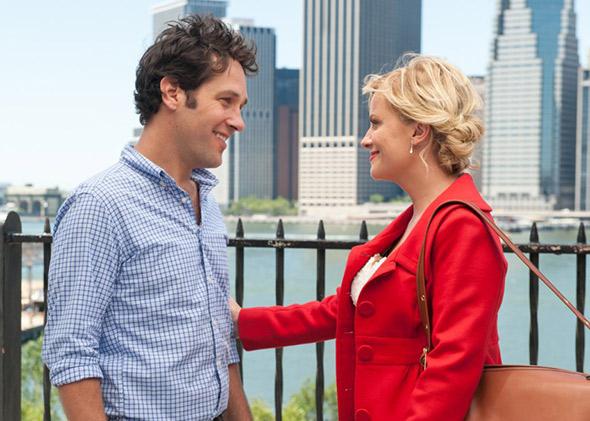An Airplane!-style spoof of the Hollywood romantic comedy, created by the director/writer team that sent up the summer-camp genre in grand, sick, raunchy style with Wet Hot American Summer. That sounds like such a fun movie that it’s tempting to build up They Came Together, directed by David Wain (Role Models, Wanderlust) and co-written by Wain and Michael Showalter, as the second, well, coming of a fresh voice in American comedy. But somehow the manic energy and sense of improvisatory freedom that animated Wet Hot American Summer (known as WHAS to its cult fans) never quite translates in the spottily funny They Came Together, despite the presence of many of the same comic talents, including Amy Poehler, Paul Rudd, and Christopher Meloni (who, though best known as a tough sex-crimes detective in Law and Order: SVU, once memorably humped a refrigerator as WHAS’s unstable camp chef).
They Came Together (whose double-entendre title is one of the dirtier jokes in this generally mild R-rated comedy) sends up rom-com clichés any which way it can: by exaggerating them, reversing them or, in its less successful moments, simply holding them up for the audience to observe. We open in a Manhattan restaurant, where two yuppie couples, Molly and Joel (Poehler and Rudd) and their friends (Bill Hader and Ellie Kemper) are sharing cloying stories of their respective meet-cutes. The flashbacks that ensue are occasionally intercut with scenes of this foursome at the table, as Joel and Molly first beg, then order their friends to stay put for the rest of their increasingly elaborate tale.
The inevitability of Molly and Joel’s love is telegraphed by a deliberate convergence of overfamiliar genre tropes. Set up by friends at a Halloween costume party, they both show up dressed as Ben Franklin and dislike each other immediately. (A tense elevator ride with a glowering Rudd and Poehler in identical bald wigs and knee breeches is a high point.) He’s a hard-driving exec at the soulless corporate monopoly Candy Systems and Research; she runs a neighborhood candy store so adorable that 100 percent of the proceeds go to charity. The two establish a mutual loathing that only later turns to attraction, when a chance meeting in a bookstore finds them marveling at the coincidence that they both enjoy “fiction books.” Soon they’re falling in love, their happiness threatened only by jealous exes, eccentric parents (Molly’s are enthusiastic and unapologetic white supremacists, making for an uncomfortable introductory dinner) and Joel’s shifty CEO at the candy company (played with delectable relish by Meloni).
They Came Together’s best moments occur in throwaway visual gags that puncture the glossy surface of rom-com idealization. As Molly and Joel frolic in a pile of autumn leaves, the camera pulls back to reveal a dead body lying unnoticed nearby. Joel’s dream of opening an independent coffee shop called “Cup of Joel” finally comes true—in the form of a pathetic sidewalk concession with a single drip-coffee machine and flimsy Sharpie-on-cardboard sign. And in even weirder, if generally less successful, moments, Wain and Showalter abandon the pretense of plot entirely to dive down rabbit holes of Dadaist absurdity. A conversation between our brokenhearted hero and a literal-minded bartender turns into an infinite loop of repeating dialogue. A comforting hug from a wisdom-dispensing grandmother turns unexpectedly suggestive (this last gag fails miserably and leaves an icky aftertaste, but you can’t fault it for not daring to go there).
For most of its wispy 83-minute running time, though, They Came Together traffics in goofier and more predictable jokes, some of which seem imported straight from either a Monty Python sketch or one of the Zucker/Abrahams/Zucker genre spoofs of the ’80s. As Molly consults with her best friend on the right outfit to wear for her new crush, a montage shows her in full chimney-sweep getup, tennis whites, a prom dress, and finally a suit of clanking medieval armor. A snooty French waiter who Joel describes as having “a pole up his ass” turns out to be sporting that very accessory, making for a lot of broken tableware as he moves through the restaurant. The whole production has an agreeable let’s-put-on-a-show looseness, with veteran comic and dramatic actors (Ed Helms, Kenan Thompson, Michael Shannon) popping up in minor roles, and skit-like bursts of inspiration tending to take priority over forward momentum or consistency of tone. Rudd takes evident glee in solemnly lampooning the earnest-dude role he’s so often played in nonsatiric contexts, while Poehler brings an admirable degree of both enthusiasm and slapstick chops to her heroine’s klutzy pratfalls and Meg Ryan–esque mugging.
If They Came Together doesn’t provide a consistently palatable comedy product, it could be argued that it’s precisely because this irreverent takeoff isn’t one of the mass-produced entertainments whose conventions it mocks. In an age of interchangeable Hollywood love stories (what was the one with Jennifer Aniston and Jason Bateman again? Who can remember?), this rough-edged parody feels both distinctive and handmade, and for those reasons alone it’s a hard movie to hate, even when it temporarily loses its comic footing. Anyway, as romantic comedies down the ages have taught us, hatred is just a latent form of love.
